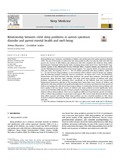| dc.contributor.author | Mannion, Arlene | |
| dc.contributor.author | Leader, Geraldine | |
| dc.date.accessioned | 2023-09-14T10:12:49Z | |
| dc.date.available | 2023-09-14T10:12:49Z | |
| dc.date.issued | 2023-06-26 | |
| dc.identifier.citation | Mannion, Arlene, & Leader, Geraldine. (2023). Relationship between child sleep problems in autism spectrum disorder and parent mental health and well-being. Sleep Medicine, 109, 4-10. doi:https://doi.org/10.1016/j.sleep.2023.05.009 | en_IE |
| dc.identifier.issn | 1389-9457 | |
| dc.identifier.uri | http://hdl.handle.net/10379/17903 | |
| dc.description.abstract | Sleep problems are a common comorbidity in children and adolescents with autism spectrum disorder (ASD). The aim of this study is to determine how sleep problems affect not only the child with ASD, but parents also. Parents of 409 children and adolescents with ASD completed the Children's Sleep Habits Questionnaire, Pittsburgh Sleep Quality Index, Parenting Stress Index-Short Form, World Health Organization Quality of Life Abbreviated Version (WHOQOL-BREF), Hospital Anxiety and Depression Scale, and the Multidimensional Scale of Perceived Social Support. The majority (86.6%) of parents presented with poor sleep. The majority (95.3%; n = 387) of children presented with sleep problems, while 4.7% (n = 22) did not have sleep problems. A cross-sectional within-subjects research design was utilised, with the following analyses conducted: Pearson correlations, chi-square tests, t-tests, and MANOVAs. Relationships were found between child sleep problems and parent sleep problems, specifically child parasomnias, sleep duration, night wakings, and sleep onset delay. Parents of children with sleep problems experienced more parenting stress, specifically on the Difficult Child and Parent-Child Dysfunctional Interaction subscales of the Parenting Stress Index-Short Form. Parents of children and adolescents with sleep problems had significantly higher levels of anxiety and depression than parents of children and adolescents who did not have sleep problems. A relationship between sleep problems and lower quality of life was found. Parents of children with sleep problems received significantly lower scores on the WHOQOL-BREF domains of Physical Health, Psychological and Environment than parents of children without sleep problems. There was no significant difference found between parents of children with or without sleep problems on perceived social support. The current study demonstrated how child sleep affects parental well-being. While sleep problems are one comorbid condition in ASD, future research is needed to determine the impact of other comorbidities in parents of children and adolescents with ASD. | en_IE |
| dc.format | application/pdf | en_IE |
| dc.language.iso | en | en_IE |
| dc.publisher | Elsevier | en_IE |
| dc.relation.ispartof | Sleep Medicine | en |
| dc.rights | Attribution 4.0 International (CC BY 4.0) | |
| dc.rights.uri | https://creativecommons.org/licenses/by/4.0/ | |
| dc.subject | Autism spectrum disorders | en_IE |
| dc.subject | Sleep problems | en_IE |
| dc.subject | Comorbidity | en_IE |
| dc.subject | Parent mental health | en_IE |
| dc.subject | Parental well-being | en_IE |
| dc.title | Relationship between child sleep problems in autism spectrum disorder and parent mental health and well-being | en_IE |
| dc.type | Article | en_IE |
| dc.date.updated | 2023-09-08T21:45:50Z | |
| dc.identifier.doi | 10.1016/j.sleep.2023.05.009 | |
| dc.local.publishedsource | https://doi.org/10.1016/j.sleep.2023.05.009 | en_IE |
| dc.description.peer-reviewed | peer-reviewed | |
| dc.internal.rssid | 31679466 | |
| dc.local.contact | Arlene Mannion, Irish Centre For Autism, & Neurodevelopment Research, School Of Psychology, Nui Galway. Email: arlene.mannion@nuigalway.ie | |
| dc.local.copyrightchecked | Yes | |
| dc.local.version | PUBLISHED | |
| nui.item.downloads | 28 | |


